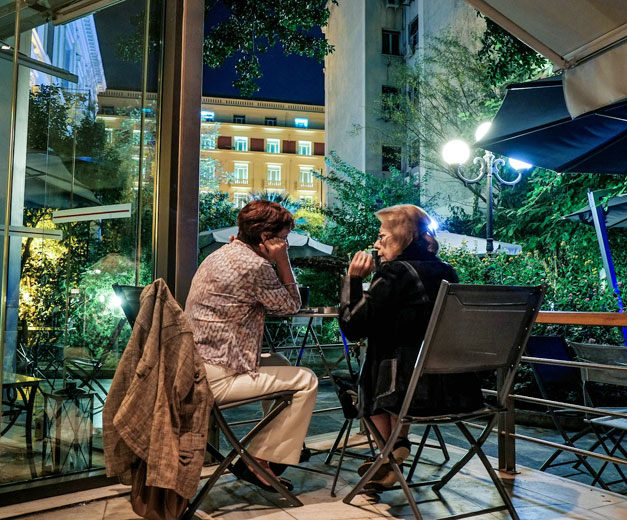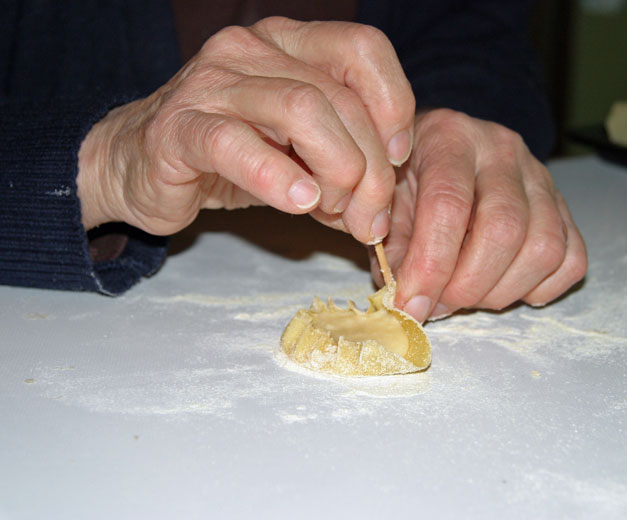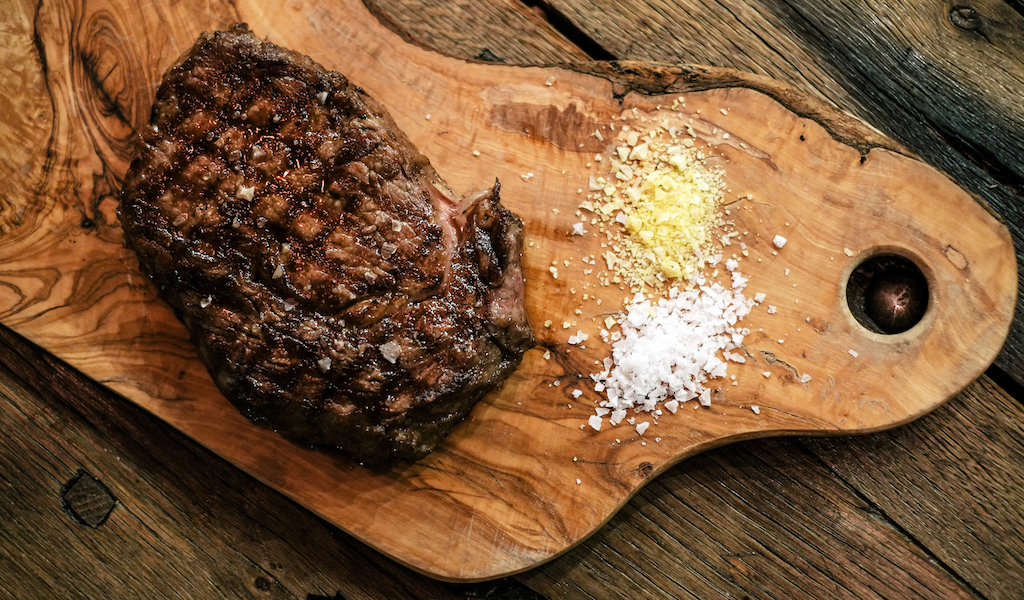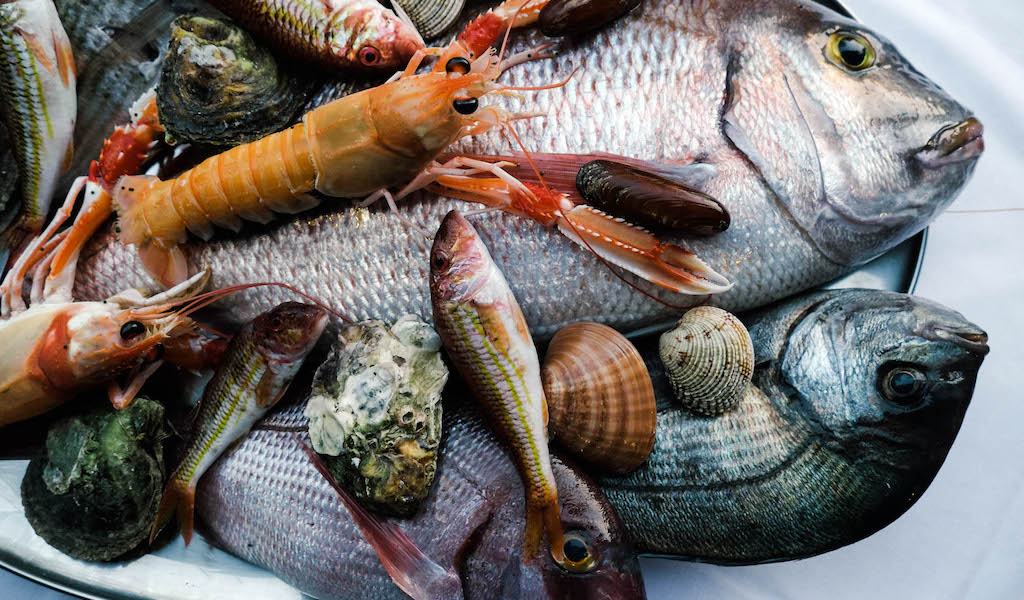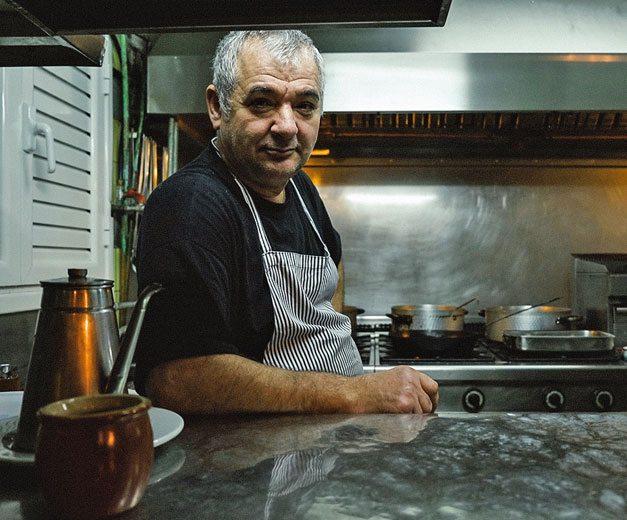We can't find the internet
Attempting to reconnect
Something went wrong!
Hang in there while we get back on track
Search results for "Christiana Thomaidi"
Athens
Vasilopita: A Sweet Tribute to the New Year
Just after the stroke of midnight on New Year’s Eve or on the first day of the New Year, many Greek Orthodox families gather around the table to cut and split the vasilopita, a cake named after St. Basil (Aghios Vasilios), the Greek Santa Claus. The head of the family “crucifies” the cake three times with a knife and then cuts it into triangular pieces. Usually, the first piece is offered to Christ, the second to the Virgin Mary, the third to St. Basil and the fourth to the “house” before family members and friends each receive one. Some may offer a slice to St. Nicholas, the patron of sailors, to the poor, as St. Basil cared for them, or to the family shop or company.
Read moreAthens
Athiri: Rare Elements
On a busy thoroughfare in Keramikos near the bustling neighborhood of Gazi, it’s easy to miss Athiri – but we urge you to keep an eye out for this culinary gem. When we last visited the restaurant, the polite waiters welcomed us with gracious smiles. We chose a table in the verdant courtyard, a small oasis in the heart of Athens. The interior of the restaurant is simple and elegant as well, with modern details to complement the lovely atmosphere. Chef Alexander Kardasis has a personal and modern vision of Greek cuisine and is always striving to create clean flavors with traditional underpinnings. To that end, he’s assembled a collection of the finest raw materials, many of which arrive fresh daily.
Read moreAthens
Melomakarona: For a Sweet (and Crumbly) Christmas
The debate rages on: which are Greece’s best traditional Christmas cookies, kourambiedes or melomakarona? Amongst our friends and family, moist, honey-soaked melomakarona win out over the crumbly, butter-rich almond kourambiedes. The word “melomakarona” is a combination of meli, which means “honey,” and makaronia, which comes from the ancient Greek word makaria (μακαρία), meaning “blessed” (and having nothing to do with the Italian pasta with the Greek name “macaroni”). Long ago, the makaria was a piece of oval-shaped bread made for a funerary dinner to bless the dead. Later on, the makaria was soaked in honey and became known as melomakarono (the singular form of the word; these cookies are also called finikia by some).
Read moreAthens
The Giving Tree: An Introduction to Greek Olive Oil
In Greece, where the land is mostly rocky and steep and the climate hot and arid, the olive tree thrives, and for millennia, olive oil has been as essential to Greek cooking as the gnarled, silver-leaved trees have been to its landscape. Greece is the third largest producer of olive oil in the world after Spain and Italy and the greatest in consumption per capita. Used liberally as a cooking fat for all manner of ingredients and preparations, as well as in its raw state to dress or flavor dishes, olive oil also plays an influential role in Greek baking, such as in koulourakia, twisted or coiled cookies, and paximadia, the twice-baked rusks that come savory or sweet.
Read moreAthens
Spring Greening: Athenian Gardens of Eating (and Drinking)
In terms of greenness, Athens doesn’t even come close to other European capitals with their verdant parks and blossoming gardens. The truth is, modern urban development has not been particularly gentle with this city. Numerous concrete buildings along with poor road design hem in inhabitants and visitors with featureless views. Thankfully, there are some oases in the cement desert that offer the hungry local or tourist a lush respite in which to enjoy a meal or a drink. Just behind the parliament lies the Ethnikos Kipos, or National Gardens, the indisputable green heart of the city.
Read moreAthens
Green Scene: Athenian Gardens of Eating (and Drinking)
In terms of greenness, Athens doesn’t even come close to other European capitals, with their verdant parks and blossoming gardens. The truth is, modern urban development has not been particularly gentle with this city. Numerous concrete buildings, along with poor road design, hem in inhabitants and visitors with featureless views.
Read moreAthens
CB on the Road: Seafood in Nea Artaki
Chalkida, the small peninsula on central Evia (Euboea) just an hour’s drive from Athens, is an ideal day-trip destination for urbanites. It’s famous for an unusual phenomenon, in which the tide in the Strait of Evripos changes direction several times a day, and it’s also known among tourists for its fresh and delicious fish and seafood. When Chalkideans want fresh seafood, however, they head to the less touristed town of Nea Artaki, just north of Evia’s main city. In the tiny port, there’s a classic promenade lined with taverns, and the penultimate, Teskos, is our favorite destination. On a recent visit, the weather was beautiful, sunny and cool enough for us to sit on the sidewalk adjacent to the sea.
Read moreAthens
Melitinia: Island Easter
The Holy Week in Greece is full of scents and flavors. Ovens work overtime baking brioches (tsourekia), Easter biscuits and melitinia, diminutive sweets that originate from Santorini. Traditionally, melitinia are made by women and girls on Holy Tuesday to be eaten on the evening of the Resurrection and the coming days of Easter (Orthodox Easter falls on April 12 this year).
Read moreAthens
Base Grill: All Your Meats Belong to Us
In Athens’ western suburbs, near bustling Bournazi Square, sits Base Grill, a steakhouse where regulars converge from every part of Athens. At their restaurant, twin brothers Spiros and Vangelis Liakos have taken the art of grilling to new heights. Base Grill has the atmosphere of a modern tavern: old posters on the walls, soft colors, nothing extravagant. The space is often packed, so we recommend reserving – especially on weekends.
Read moreAthens
Greek Food Idioms: Turning Sour Grapes into Honey
With its rich, profound history – its roots lie in epics and at the foundation of modern civilization, after all – the Greek language is ripe for and with metaphor, particularly of the food-related variety. Folk sayings and proverbs have a prominent place in colloquial language and everyday life, and they are at turns humorous, instructive and ironic. And sometimes they are all three at once.
Read moreAthens
Go Fish: Athens' Top 5 Seafood Restaurants
Update: This spot is sadly no longer open. In Athens, we take full advantage of our proximity to water. An incredible variety of fresh fish and seafood go straight from the fishing nets into our pots and onto our grills. So naturally, we know a thing or two when it comes to seafood restaurants. One is the master of fried dishes, another grilled, while yet another on our short list is known for creative experimentation. What they have in common is supremely fresh seafood at a reasonable price (as well as a penchant for fishing nets as decoration, it seems). And they’re all located close to the sea – where else could they be? In no particular order:
Read moreAthens
Vyrinis: Homeward Bound
Behind 2,340-year-old Kallimarmaro Stadium, located in the picturesque area of Athens between Mets and Pagrati, lies a scene that would not be out of place in a provincial city: small neighborhoods, old houses, hilly roads, stray cats, a couple of abandoned houses and old taverns. Among the last, we love Vyrinis, which is especially old and now in the hands of the third generation of the same family. The restaurant has been renovated and updated but still retains some elements of the old tavern, such as the huge wine casks that serve as decoration and the small backyard. Here, young and old contentedly intermingle, and the friendly, always smiling waiters add to the cozy, welcoming atmosphere.
Read moreAthens
Alatsi: Greek Revival
Update: This spot is sadly no longer open. Last summer, we took a look at the popularity of Cretan cuisine in Athens and noted that Alatsi, which introduced the island’s cooking to the city in 2005, had since seen a decline in fortunes. Until now. In early September, Pericles Koskinas took over at the helm and steered the restaurant back on course. The former chef of Milos Athens, Koskinas is famous for his simple and seasonal approach to cooking. He has a talent for bringing out the best in his raw materials with the least possible manipulation and tangling of flavors. Leaving behind a high-end restaurant to resuscitate another whose reputation had tanked was no small undertaking. His first move? He jettisoned the strict Cretan theme, looking beyond the island to all of Greece – and further still. He sources ingredients from small producers, and the majority of them have a protected designation of origin, including wild greens from Messinia, beef and xinotiri (sour cheese) from Naxos, apples from the Taygetos Mountains and eel from Arta.
Read moreAthens
Bar Bee Kiou: Have It Your Way
Known for its excellent fish and seafood, the port town of Piraeus, just west of Athens, was not until recently a destination for meat lovers. But that all changed a year ago with the opening of Bar Bee Kiou. Situated in the center of town, a two-minute walk from Zea Harbor, this tiny eatery is the ideal place to cap off a promenade around picturesque Pasalimani.
Read moreAthens
Breakfast in Athens: The Morning Report
Editor's note: We are regret to report that Nixon and Hip Cafe are closed. Editor's note: Our third installment for CB's Breakfast Week takes us to Athens, where we take a look at traditional breakfasts and how globalization is changing the way Greeks eat -- especially on weekend mornings. In Athens, brunch has become big business. Over the last couple of years, locals have fully embraced this foreign import, and numerous venues have sprung up across the city to bring Eggs Benedict and Bloody Marys to hungry Athenians every weekend.
Read moreAthens
Magemenos Avlos: Mad Men in Athens
Just a stone’s throw from centrally located Vasileos Konstantinou Avenue, the tree-lined neighborhood in and around Plateia Proskopon (Scouts’ Square) is verdant and full of charm. Wonderful dining options abound here, with new entrants such as the popular Mavro Provato joining a host of beloved older eateries. Among the latter is Magemenos Avlos, a glamorous throwback specializing since 1961 in European cooking, and a favorite meeting place of musicians, poets, actors, politicians and remarkable personalities of the 1960s and ’70s.
Read moreAthens
Culture Clubs: Athens' Top Spots for Greek Yogurt
In a recent New Yorker profile of Turkish entrepreneur Hamdi Ulukaya, founder of Chobani, a wildly successful company that makes Greek-style yogurt in the U.S., we read with great interest about the trip writer Rebecca Mead made to Argos, in the Peloponnese, where renowned cookbook author Diane Kochilas had told Mead she’d had “the best yogurt she had ever tasted.”
Read moreAthens
Valentina: From Russia with Love
As the weather gets colder and the nights longer, we seek out food that will warm us from the inside out. Although the usual comfort food we enjoy is souvlaki, there are times when warming food from a colder clime is just what we need. And that’s when we head to Valentina.
Read moreAthens
All Natural: A Shopper's Guide to Greek Wild Herbs
We’ve talked before about Greek coffee, and it’s true that going out for coffee is one of Athenians’ favorite pastimes, but there are plenty of Greeks who prefer tea or infusions. And in fact, the practice of gathering wild herbs has a history that stretches all the way back into antiquity. References to Mediterranean flora are found everywhere in history, from Egypt to Asia Minor and from Homer to the ancient Greek philosophers’ texts. Take, for instance, Hippocrates, the so-called father of medicine, who focused on the healing properties of plants and actually recorded about 400 species of herbs and their known uses in the 5th century BCE. That era saw a heavy trade in herbs between the Mediterranean and the East.
Read moreAthens
Taxidevontas: Fisherman's Friend
In Piraeus there is a tacit agreement among locals to keep treasured taverns and restaurants hidden, lest they be overrun by the tourists arriving on the cruise ships that dock in town. This is particularly true of Keratsini, a neighborhood on the outskirts of the port city. In 1922, Keratsini became home to Greek refugees driven out of Smyrna, the coast of the Sea of Marmara and Constantinople during fighting between Greece and the nascent Turkish state. At first, these immigrants were treated poorly and suffered poverty and hardships, but eventually they became a vital part of the Greek population.
Read more




